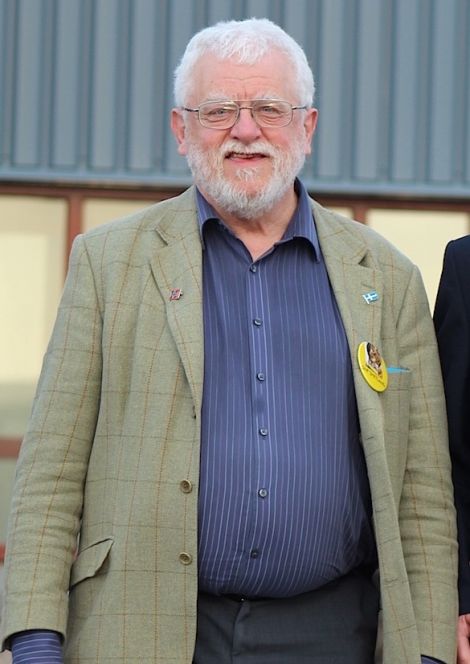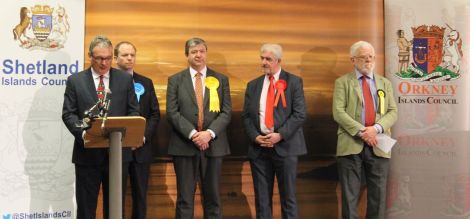News / Skene: SNP not a ‘foreign, centralising force’
THERE is “no way” the Scottish government can defend local authorities and individuals in Scotland from the impact of the next round of Tory spending cuts, according to the man who very nearly won the Northern Isles seat for the SNP.
Danus Skene, who came within 816 votes of ousting Lib Dem Alistair Carmichael last week, warned there is “bound to be a further assault” from Conservative chancellor George Osborne.
The 71 year old is “not looking for” the nomination to take on Tavish Scott in next year’s Holyrood elections because of “sheer age”.
“But we’ve got to build on this and involve at a competitive, senior level new people,” he told Shetland News on Tuesday.
“There’s a very strong argument that successful candidates up here must be locally based. I’ll do what I’m asked – whether [that’s] delivering a few leaflets or being the front man, I’ll wait and see.”
Although one of only three out of 59 SNP candidates not to have won, given the huge majority Carmichael had going into the election, Skene is generally-speaking happy with the campaign effort.
“I always argued that a win was possible if all the ducks lined up, and they more or less did in terms of the so-called surge of the SNP vote more widely, the collapse of the Lib Dem one [and] Alistair’s repeated attempts to shoot himself in the foot,” he said.
Skene made much during the campaign of his belief that the LibDems have “lost their soul” and no longer carry the legacy of former leader and Northern Isles political hero Jo Grimond.
“I don’t think there is much connection between the party [today] and the principles of classical liberalism – unless they make that reconnection that’s the end of that story.”
Become a member of Shetland News
He also came across “considerable dissatisfaction with Alistair Carmichael personally” on the doorstep, with people saying “I cannot vote for him again – that was stronger in Orkney than in Shetland”.
Skene said that perception was not helped by the MP’s role in the Whitehall leak against Nicola Sturgeon, which is still being investigated, or the “downright untruths” he feels were being spread about the SNP.
“We’ve repeatedly been told by the local establishment that the SNP and Scottish identity is a foreign, centralising force that doesn’t belong here. I think we’ve actually disproved that in this election, though not comprehensively enough or we’d have won.
“[He was making] claims about RET [Road Equivalent Tariff] while hiding the extent to which Liberal transport ministers in the Lib-Lab coalition government had subsidised the very inefficient northern ferries.”
Nationally, he believes the SNP’s success is in part down to the failings of the Labour party which, for instance, has “run Glasgow at a municipal level for 85 years and has got nothing to show for it”.
“I think it has at last dawned [on voters] that the Labour party is not capable of delivering what it is traditionally said to deliver for ordinary earners and those in need.”
Skene said Labour enjoyed little credibility with the electorate, who weren’t sure if they were “trying to do the same thing as the coalition a bit more gently, or were they offering a radical alternative?”
“Since the election all the gossip in the political village has been about how they’d have done better not to have abandoned Blairism, which was Thatcher part two – a softer version of the Tory story. Scotland does not want that.”
The SNP’s “positive message” about fairness and the economic flaws of pursuing austerity also got through to voters, Skene thinks.
“The argument I made repeatedly is that Osborne is still borrowing £90 billion a year, and there is not a recovery visible in people’s pockets.
“What the SNP was promising, holding out in terms of hope, was reinvestment in the economy combined with fairness, a commitment to redistribute – that strikes an attractive chord with the majority of people.”
He accepts that, in concrete terms, the 56 SNP MPs may achieve “relatively little” in the face of a majority Tory administration.
“But it’s now part of a long game. I don’t think anybody, not even the remarkable Ms Sturgeon, knows how this is going to play out. There could be crisis over the EU referendum, which I gather David Cameron is proposing to accelerate.
“If Cameron fails to deliver at least [the] Smith [Commission proposals], that is also a possible trigger.”
Skene said he took “no joy” in making the argument that Scottish civil society is likely to “explode” over a diminishing amount of public money to spend.
Pubic spending restraint has already seen the SNP endure “real difficulty” dealing with problems in the education system and the NHS, Skene added, and “there is no way [the Scottish Government in] Edinburgh can defend local authorities – and individuals who are dependent on state support – from the next round of cuts”.
Become a member of Shetland News
Shetland News is asking its many readers to consider paying for membership to get additional features and services: -
- Remove non-local ads;
- Bookmark posts to read later;
- Exclusive curated weekly newsletter;
- Hide membership messages;
- Comments open for discussion.
If you appreciate what we do and feel strongly about impartial local journalism, then please become a member of Shetland News by either making a single payment, or setting up a monthly, quarterly or yearly subscription.





























































